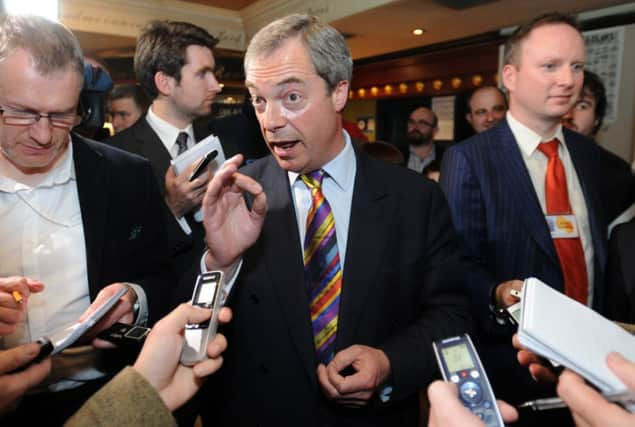Comment:Ukip result not general election predictor


In 2009, Ukip won 16.5 percent of the vote. According the first results reported last night, Ukip won over 30 per cent.
Based on these figures it is only natural to predict that Ukip will finally achieve representation at Westminster in next year’s General Election. This would be a hasty conclusion.
Advertisement
Hide AdAdvertisement
Hide AdThe result is undoubtedly a success for Mr Farage personally and an indication that his views resonate with large sways of the electorate.
But the result is not a good predictor of next year’s Westminster elections
European elections are what political scientists call “second order elections”; turnout is lower than in general elections, voters are more likely to vote for protest parties and electors often use European elections to punish the incumbent parties.
This is the way it has been in all the previous European elections since 1979.
There are several examples of European elections which saw the rapid rise of protest parties.
In 1989, the Green Party won 14.5 per cent of the vote in the European elections, but only secured a meagre 0.5 per cent of the vote in the general election in 1992.
The result from last night is a triumph Ukip. But – as the Green example shows – Mr Farage will be aware that strong European results have never previously translated into representation at Westminster.
Indeed, in 2009, Ukip beat Labour and the Liberal Democrats into third and fourth place, respectively. And yet, Ukip only won 3.1 per cent of the vote in the Westminster elections in the following year.
Advertisement
Hide AdAdvertisement
Hide AdUkip does well in European elections when it can capitalise on anti-immigration sentiments.
To be able to repeat the result from last night at Westminster, Ukip needs to develop policies on health, social affairs and the economy that resonate with the disgruntled voters.
The party has developed a credible voice on Europe and immigration, but voters are less likely to trust them on issues like the NHS and the economy.
Last week, Mr Farage argued that Ukip is repeating the electoral rise of the Lib Dems under then leader Paddy Ashdown in the 1990s.
It is true that the Lib Dems increased their vote share from 3 percent in 1992 to 17 per cent in 1997. But circumstances were different.
The Lib Dems’ success in 1997 was largely due to tactical voting by Labour supporters, who were keen to minimise the chances of a fifth consecutive Conservative victory.
Ukip and Mr Farage are unlikely to benefit from tactical voting, except from small and inconsequential right-wing parties. The success for the Lib Dems is unlikely to be repeated by Ukip.
It is not inconceivable that Ukip may win a small number of seats in the Westminster elections – but it is virtually impossible to repeat the result they achieved in the European elections.
Advertisement
Hide AdAdvertisement
Hide AdAlthough Ukip took votes from all parties, it is still the Conservative voters who are most likely to defect to Ukip.
A good showing for Ukip in 2015 is likely to diminish the chances of a Conservative majority government, and hence the chances of an in-out referendum taking place.
Like in 1983, when a vote for the Alliance weakened the chances of a Labour victory, a vote for Ukip in 2015 may paradoxically strengthen Ed Miliband and the Labour
Party.
Nigel Farage promised an earthquake. The psephological mountain certainly shivered, but come the general election, it will – in all likelihood – only give birth to a mouse.
• Matt Qvortrup is author of Referendums And Ethnic Conflict published by Pennsylvania Press